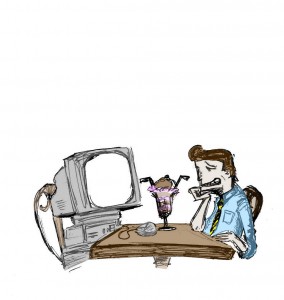In January 1999, the Euro currency was introduced to the European economy, President Bill Clinton was impeached, and Michael Jordan announced his retirement from basketball.
At the same time, the Internet was reaching the masses, including many students at UR.
One particular expansion was the introduction of websites as a legitimate mode to search for prospective friendships and relationships.
In a 1999 Campus Times article, published on Jan. 28, Senior Staff Writer Carla Engelbrecht covered the increasing popularity of online dating, including its logistics, perils, and tips for successful communication.
While writing the story, Engelbrecht conducted a social experiment in which she published a personal advertisement on “Yahoo! Personals!,” a site that allowed one to create an online alias that could interact with others, much like a modern-day Facebook.
Through the experiment, Engelbrecht noted that once narrowing the parameters of potential suitors to include men in their “twenties” in the “Rochester area,” she did not receive matches that matched these restrictions, but rather was given suggestions of men that came from places such as Texas or Kentucky who ranged from 17 to 40 years old.
Furthermore, once starting conversations with some of these men, she realized that people would simply tell her things that she wanted to hear as opposed to the truth.
One man responded to Engelbrecht’s post about her love for cooking by stating, “I love to cook, but I don’t know how.”
On more than one occasion, Engelbrecht noted that men were willing to pronounce that they were searching for their soul mate, formulating pick-up lines such as “I think I am a lot like what you’re looking for” despite having never actually met.
As the Internet has grown and developed into what it is today, sites including Facebook, match.com, and the like have emerged so that people can communicate with others in a more time efficient manner where people can connect on a more personally.
While it was difficult for Engelbrecht in 1999 to discern which people online were legitimately good people and which were dangerous, it is much easier today to evaluate a person by simply scanning their Facebook page.
Although this is convenient, it can also have negative effects.
“I can look up virtually anything about someone I want to know more about. While this can be useful, it is is also bad because people often tend to judge people based on their Facebook profiles, and how one appears online is not always how they are in person,” freshman Charlotte Cohen said.
Whether preparing for a big date or a job interview, the Internet can be a useful tool in getting a better understanding of people but can often cause one to draw conclusions based on superficial fact rather than through face-to-face conversation.
As Engelbrecht wrote in her article, “I created my [personal advertisement] under my middle name, just to be safe,” demonstrating that not everything on the Internet is true, inciting further danger when interacting with others on the World Wide Web.
Cohen concurs with Engelbrecht, stating that today “people use the Internet as a shield, and that’s not really how they are.”
While a person would most likely not disclose personal information to a complete stranger off the street, the same people often feel differently when it comes to posting information on online sites.
When comparing online interactions of 1999, there is a larger risk today of running into trouble, whether seeking a relationship or just in the daily actions on Facebook as more people are connected online through social media.
Through the evolution of virtual communication on the Internet, there is less of a chance that one will interact with unwanted visitors as Engelbrecht did in 1999.
At the same time however, more people have access to the personal information of others, prompting individuals to take further caution when surfing the web.
Lerner is a member of
the class of 2016.



